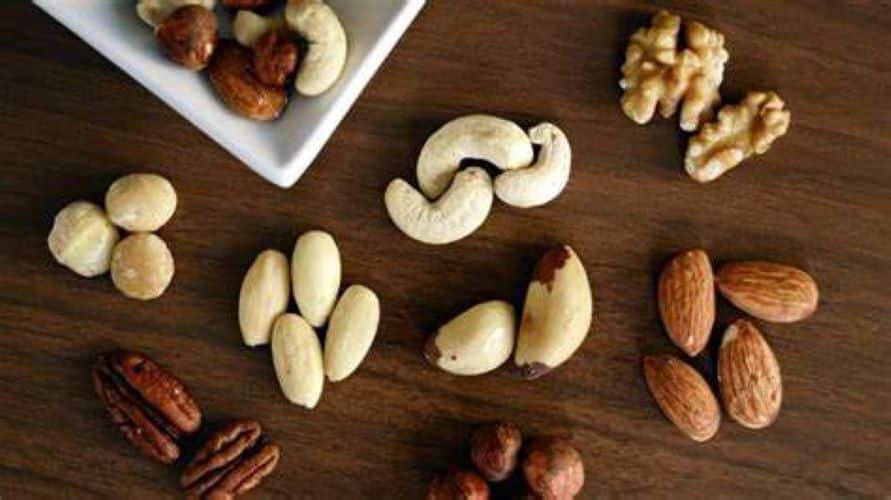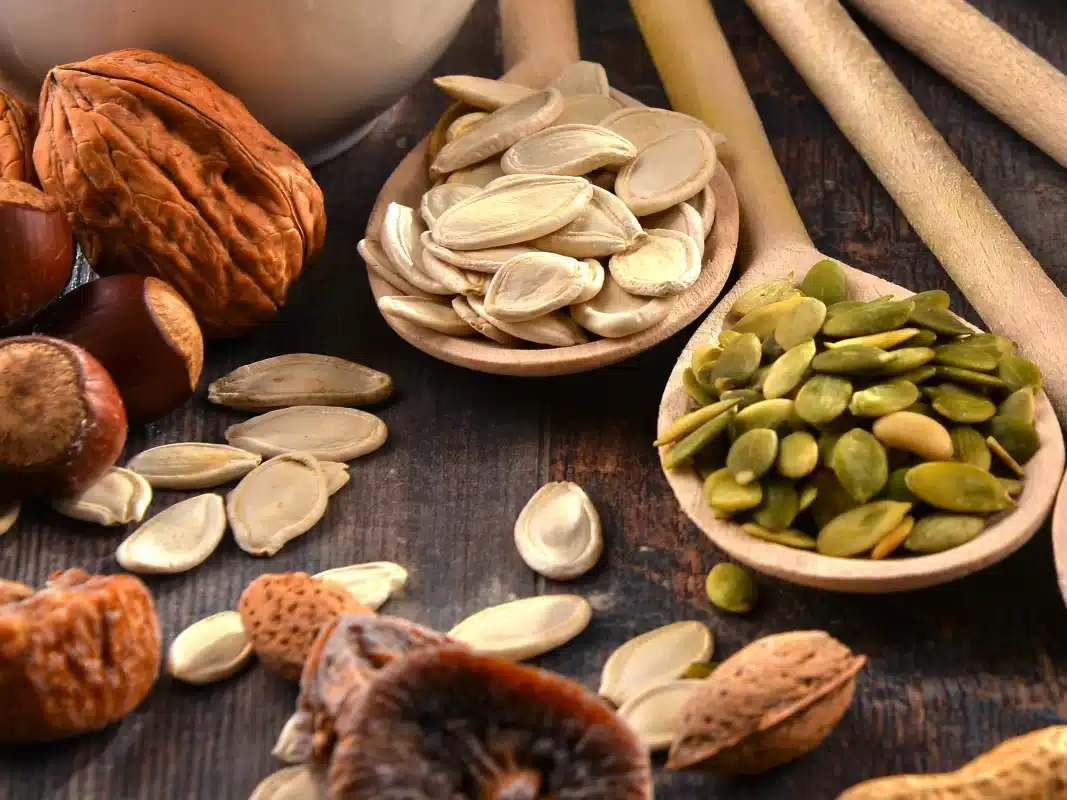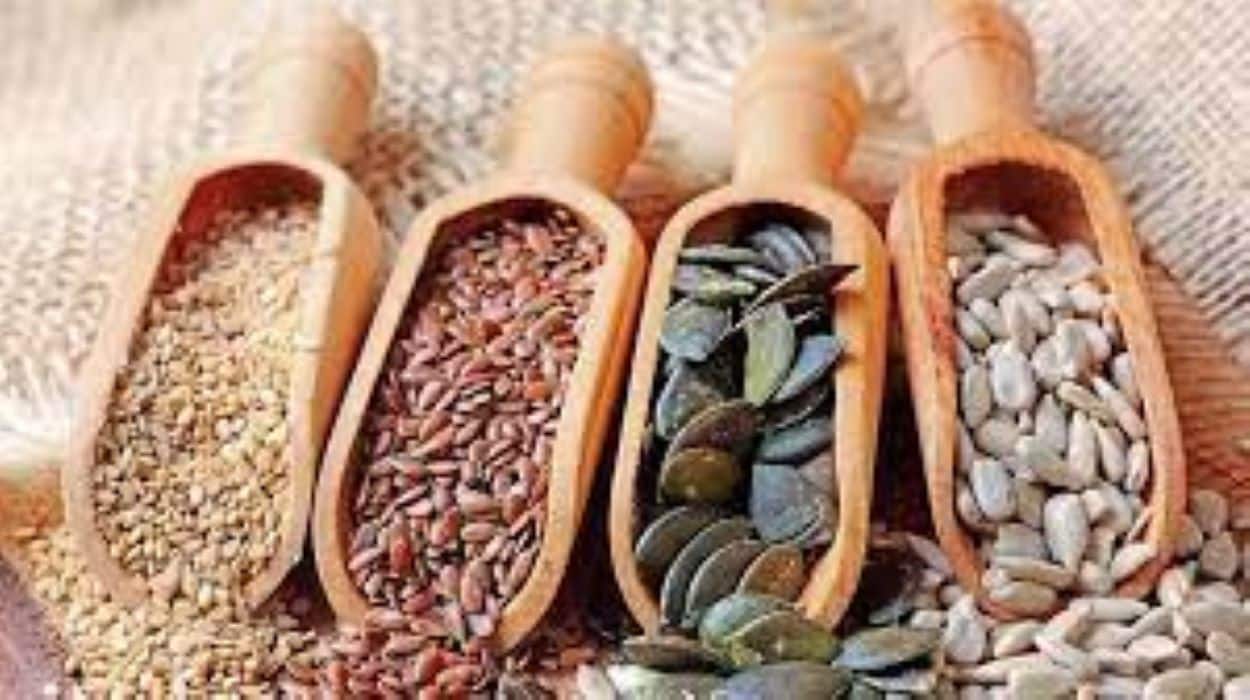What are Nuts?Nuts are fruits which come in a hard shell (made of impregnable bark) that is inedible when it is fresh. It contains one seed inside, and they come in different sizes and taste.
Nuts are not just a handful of delicious energy they are also a storehouse of nutrients! In fact, most of the nuts and nut oil have a significant source of calories (almost 50-75%) and fat in them. This fat is generally unsaturated fatty acids that come in the form of n-3 (linolenic) fatty acids, mono unsaturated fatty acids and polyunsaturated fatty acids. These compounds help to support all round health since they play an important role in reducing body fat, controlling cholesterol levels, and supporting the heart.
Nuts are the most perfect of food. They are full of nutrients and health benefits. They help control cholesterol with their polyunsaturated fat content. Nuts also contain fiber and minerals, which are important to healthy living. Brazil nuts have a lot of selenium in them which helps prevent heart diseases, prostate cancer and Alzheimer’s disease. Groundnuts help keep blood sugar under control because they are high in fiber, which makes them an ideal snack for diabetics. Hazelnuts help in the proper development of babies since they contain folate, calcium, iron and folic acid.
Outline:
-
Almonds: The King of Nuts
-
Walnuts: The Powerhouse Snack
-
Cashews: An Excellent Source of Vitamin E
-
Pistachios: A Versatile Nut Perfect For Any Occasion
-
Peanuts: Packed with Protein and Other Nutrients
-
Macadamias: Rich in Omega 3 Fatty Acids
-
Brazil Nuts: A Superfood Rich in Selenium
-
Hazelnuts: Loaded With Antioxidants And Vitamin E
-
Pecans: Natural Defense Against Free Radical Damage
- FAQ
Almonds: The King of Nuts
Almonds are one of the most nutritious foods on Earth. One raw almond, which weighs 22 grams contains: Almond RDA Almonds contain healthy fats (good cholesterol). 14g Per 100 g 9% Protein 72 mg Vitamin E (of which 1.6mg are a very effective antioxidant) 10% Magnesium 81.5% Calcium 5% Potassium 15% Copper 50% Manganese 30% Phosphorus 300mg 15% Riboflavin 4.4% Selenium
Almonds contain many nutrients, including calcium, protein, riboflavin and magnesium. In fact, almonds are one of the most nutritious foods on Earth.
The almond is a small, hard-shelled nut that comes from the fruit of the almond tree. The word “almond” comes from Old French almande and is itself derived from the Latin word amandua, which was derived from Greek ἄμοδος (ámodoς) “nut”, in turn thought to be derived from ἀμόνθα (amónda) “food of nuts”.[1] Almonds are delicious in desserts such as marzipans, and also used cherry-picking in California. They are very high in calories, fats and protein, yet very healthy for you!
Almonds are snackable and versatile. They are a tasty, natural way to prevent heart disease, boost brain function, and keep you looking your best.
Walnuts: The Powerhouse Snack
One of the most wholesome nut that has many health benefits. Walnuts have omega 3 fatty acids which supports healthy brain functions, It also has antioxidants to lower the risk of cardiovascular diseases and cancer.
Walnuts are the powerhouse snack. They are packed with a number of essential nutrients and health benefits.
Walnuts are a super food. Easily consumed, rich in nutrition and pure deliciousness. They have been worshipped for generations by people all over the world, but this is not science fiction, it’s reality.
Walnuts are considered the healthiest snacking nuts around and are rich in many health-boosting nutrients. Walnuts are a good source of fat and protein, both of which help you to keep going throughout the day, and also gives you much-needed fuel to exercise effectively. They act as excellent antioxidants in your body and protect your cells from free radical damage .
If you love snacking, as I do, you might be interested in a recent study that found eating walnuts helps to improve memory. There was also another study I came across that showed the same results from pistachio nuts. When it comes to diet, nutrition and how our body works with it, nuts are of special interest to me. They are high in dietary fiber and monounsaturated fatty acids (such as oleic acid, palmitoleic acid and stearic acid), and they contain many different vitamins and minerals such as folate, vitamin B6, magnesium, manganese, vitamin E and potassium.
Cashews: An Excellent Source of Vitamin E
Cashews are a natural source of vitamin E, an antioxidant that aides in liver function to aid overall metabolism.
Cashews contain a high amount of Vitamin E which is vital for proper functioning of all bodily organs. The Vitamin E in cashews provide antioxidant protection to maintain the health of cell membranes and other biological compounds in the body.
Vitamin E is an essential lipid soluble antioxidant. Combined with its low price and taste, it has become a popular additive for food products. Cashews are a good source of Vitamin E, which is found in the oil of cashews.
Vitamin E is a great nutrient that helps improve skin health. It’s also important for brain function and may help keep your heart healthy. Did you know that cashews are an excellent source of vitamin E? In fact, one-quarter cup of cashews has a whopping 29.7% of your daily recommended value (1). If you want to experience these benefits, try snacking on some cashew pieces the next time you’re hungry!
Pistachios: A Versatile Nut Perfect For Any Occasion
Pistachios are a versatile nut perfect for any occasion. The flavors and textures of pistachios work in a variety of dishes, and there’s something for everyone!
Pistachios may seem like just another nut, but they have many benefits that make them the perfect addition to any occasion. Find out how they can benefit you — from weight loss to lowering cholesterol, from boosting heart health to promoting healthier skin.
Pistachios have a lot of health benefits. They have been shown to increase the amount of antioxidants in the bloodstream. The pistachio shell has also been proven to aid in digestion. Due to their high protein content, it is even recommended for those who are on strict diets, such as diabetic and low-calorie diets.
Pistachios are one of my favorite nuts. For those who don’t know, pistachios are a nut that comes from the Pistacia vera tree. They are usually harvested in the fall and can vary in color from burnt orange to deep green. There are three different types of pistachios: red, white, and brown (basically, their color is determined by their shell). They are high in fiber and vitamin B (which helps your body produce energy) and low in saturated fat (specifically, 37 percent less than pretzels). No wonder the pistachio has been deemed as “The Perfect Nut.”
Peanuts: Packed with Protein and Other Nutrients
Peanuts are much more than just a snack. They’re packed with protein, fiber and other important nutrients that can help you stay healthy.
Peanuts are a delicious filling snack with their own healthy benefits. Protein, fiber and good fats are packed into this tasty treat. Here are five of the best benefits of peanuts.
Peanuts are delicious, filling, and most importantly, nutritious. With 220 calories in only 1 ounce of peanuts (1.5 cups), many individuals believe these crunchy bites to be an ideal snack for burning fat. And if you have the right kind, then it is.
Everybody knows the best part about peanuts is their unique taste and convenient size. They’re perfect for snacking when you’re on-the-go, and small enough to keep in your pocket. However, few people know that peanuts are also a rich source of nutrients. It’s true. In fact, peanuts contain vitamins, minerals, protein and healthy fats that can play a vital role in your overall health. Specifically, peanuts contain 26 grams of protein – which is close to 50% more protein than found in an egg! A ¼ cup serving of peanuts also contains many other vitamins and minerals like copper, magnesium and zinc. Additionally, one serving contains up to 14% of our daily requirement of folic acid – an important B vitamin that may help prevent heart disease and memory loss later in life.
Macadamias: Rich in Omega 3 Fatty Acids
Macadamia nuts are packed with omega rich fatty acids, low in saturated fat, no cholesterol and they taste the best.
Macadamia nuts are derived from the nuts of the Macadamia tree that is native to Australia and can grow in a wide variety of soils. They are commonly available in three grades: Single Nut Packs, Roasted & Salted Packs and Natural Raw Packs. And guess what? They’re also rich in Omega 3 fatty acids. Yes!
Macadamias (Macadamia integrifolia) are a small tree which have been grown in eastern Australia for many years. They are native to the Australian rainforest, and do best in tropical conditions. Macadamias can be used for food, with their native habitat being ideal for growing them. When I say ‘food’, I mean that they can be eaten straight away (such as fresh nuts). Or they can be used to make oil or butter, which can then be eaten or used in cooking. It takes 4 kilograms of raw macadamias to produce 1 litre of macadamia oil.
Brazil Nuts: A Superfood Rich in Selenium
Brazil nuts are a tasty snack, but they are also one of the richest sources of selenium, an essential mineral that is part of the antioxidant enzymes.
Brazil nuts are rich in selenium, a trace mineral that plays a role in immune support, preventing heart problems and cancer.
Brazil nuts are rich in selenium, a mineral also found in brazil nut trees. At the time this article was written, one ounce of roasted brazil nuts contained 3.7 mcg of selenium — almost half the recommended daily intake for men, and double the recommended daily intake for women.
Brazil nuts are the world’s largest tree- grown nut. They actually belong to a family of trees that grow on a climbers plateau in Brazil. Grown on tall trees, they are harvested after five years and weighed around 1.8 pounds. The trees have many different names such as the sapucaya and monkey food tree due to its nutritional value and ability to grow on mountain peaks where other plants struggle to live.
Hazelnuts: Loaded With Antioxidants And Vitamin E
Hazelnuts have a variety of health benefits. They are rich in wholesome fats, food that is loaded with antioxidants, vitamins, and minerals.
Hazelnuts are rich in antioxidants and vitamin E. They are very good for your heart health, brain health and overall longevity. They have high contents of monounsaturated fats and other nutrients that benefit the body.
I was looking through their Nutritional Information and almost fell out of my chair! Hazelnuts are loaded with antioxidants, Vitamins C and E, fiber, and even a decent amount of protein! Checking out their profile on shows that Hazelnuts have one of the best profiles of any nut on their site. Foods high in antioxidants block harmful molecules called free radicals from damaging your cells.
Hazelnuts are one of the greatest and most important sources of antioxidants in food. An antioxidant, also called an antitoxin, is a chemical that can stop free radical processes in our body: these processes can cause cancer and cell death. Antioxidants keep our cells clean and functioning properly; they prevent many diseases caused by oxidative stress. Some of the antioxidants found in hazelnuts are quercetin, kaempferol, glutathione, beta-carotene, proanthocyanins, and caffeic acid.
Pecans: Natural Defense Against Free Radical Damage
Free radicals are dangerous little guys. They float around in our cells, damaging the membrane that encloses them. [Pecans:] Fight back with a tasty and healthy snack.
Nature has provided us many ways to protect our bodies from harm. Antioxidant-rich foods such as pecans and other nuts have nature’s effective defense against free radicals, protecting the body from damage and premature aging.
Pecans are nutrient-dense nuts that have numerous health benefits. They contain nutraceutical substances and antioxidants that help protect the human body against free radical damage. Pecans are a delicious, nutritious snack that can improve your overall health.
Pecans are good to eat now and later on. They’re useful in many ways making them one of the most popular nuts worldwide. This is due to their high-quality taste and wellness benefits. Their products are widely distributed all over the world. Pecans provide the body with a robust supply of nutrients and they prevent heart issues, cancers and many more.
Here are 10 frequently asked questions on the topic The Best Nuts for Glowing Skin?
1. Q: How do nuts contribute to achieving glowing skin? A: Nuts are rich in essential nutrients such as vitamins E and C, antioxidants, and healthy fats. These components help nourish the skin, fight oxidative stress, and promote a healthy, radiant complexion.
2. Q: Which nuts are high in vitamin E, and why is it essential for skin health? A: Almonds, hazelnuts, and sunflower seeds are high in vitamin E. Vitamin E is an antioxidant that protects the skin from damage caused by free radicals, promoting a youthful appearance and healthy skin texture.
3. Q: How do nuts like walnuts benefit skin hydration? A: Walnuts are a good source of omega-3 fatty acids, which help maintain skin hydration. These healthy fats support the skin’s lipid barrier, preventing moisture loss and keeping the skin supple.
4. Q: Can nuts help in reducing inflammation and redness on the skin? A: Yes, nuts such as almonds and pine nuts contain anti-inflammatory properties. Consuming these nuts can help reduce skin inflammation and redness, providing a clearer complexion.
5. Q: Which nuts are rich in selenium, and how does it contribute to skin health? A: Brazil nuts are a great source of selenium. Selenium aids in maintaining skin elasticity and reduces the risk of skin cancer. It also fights inflammation and promotes an even skin tone.
6. Q: How do nuts like pistachios help in controlling acne and breakouts? A: Pistachios are rich in antioxidants, promoting clearer skin by combating acne-causing bacteria. Their anti-inflammatory properties can help reduce redness and swelling associated with acne breakouts.
7. Q: Are there nuts that specifically promote collagen production for firm and youthful skin? A: Cashews and almonds are nuts rich in copper, a mineral essential for collagen production. Collagen maintains skin elasticity, reducing the appearance of fine lines and wrinkles, and promoting a youthful complexion.
8. Q: Can nuts aid in protecting the skin from UV damage? A: Yes, nuts like almonds and sunflower seeds contain vitamin E, which acts as a natural sunblock. Regular consumption can provide an added layer of protection against UV radiation, reducing the risk of premature aging.
9. Q: How do the antioxidants in nuts benefit overall skin health? A: Antioxidants in nuts, such as vitamin E and selenium, neutralize free radicals, preventing cellular damage. This protection helps maintain skin health, prevents premature aging, and contributes to a natural glow.
10. Q: What’s the recommended portion size of nuts for promoting healthy skin without excess calorie intake? A: While nuts are nutritious, they are also calorie-dense. A small handful (about 1 ounce or 28 grams) per day is a recommended portion size. This provides essential nutrients without excessive calorie intake, promoting glowing skin without unwanted weight gain.






